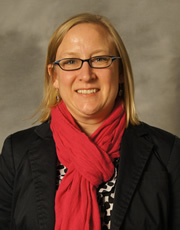Braaten to Study How Teachers Use and Learn from Data
August 6, 2013

Melissa Braaten
With increasing frequency, secondary teachers are being encouraged to use data to improve their practice. Exactly what this drive for data-driven improvement means to teachers is the focus of the work of WCER researcher Melissa Braaten.
Braaten, an assistant professor of curriculum and instruction at UW-Madison, recently received a $300,000 grant from the Spencer Foundation to study how middle school science teachers are using standardized test scores and other forms of data, such as daily interactions with students and daily assignments, to improve their instruction.
“I want to know, if teachers could choose for themselves, what kind of data would they look at and how they would use that data to make decisions,” Braaten said.
Even though the resources available for teachers to explore and learn from data are more numerous and accessible than ever before, due to new mandates, teachers are often left feeling overwhelmed with the requirements placed on them and the lack of support they are given, according to Braaten. Braaten said she felt this phenomenon herself during her 15 years as a science teacher in middle and high schools.
“Teachers are not sure which data we want them to be paying attention to,” she said.
Before answering the question of what data teachers should concentrate their efforts on understanding and using, Braaten wants to ensure she’s taken a complete inventory of all data that could be used for instructional improvement. Too often, Braaten said, the processes of data collection and analysis teachers develop individually are ignored or brushed aside in favor of broader national, state, or district initiatives.
“If data can be defined as clues to student learning, there are many teachers who have developed their own data systems – many or most teachers respond to clues students are giving them and customize their teaching to meet the needs of their students,” Braaten said. “It’s just that no one has really ever taken a systematic look at these practices.”
One example Braaten gives to illuminate this point is the routine of a teacher she observed passing out index cards at the end of each class. The teacher had her students write a sentence or two of feedback on the cards. After the period, the teacher sorted the index cards into groups based on productive student ideas seen on each card. The following day the teacher created a new science lesson highlighting and building on her students’ strengths. What initially looked like a simple “exit question” card sorting practice turned out to be a complex, student-centered planning practice.
“If all you saw was her sorting through those cards, you wouldn’t have any idea it was such a complicated practice. You need a live person there to have a conversation with the teacher and ask her what she was doing and why,” Braaten said.
Braaten said she’d also like to study how teachers share their data-collection methods and collaborate on improving their teaching.
“Much of that process is informal, but it could be highly beneficial,” Braaten said. “Unfortunately, there are probably a lot of instances where you have a teacher down the hall with a great system but she’s not sharing it with other teachers because there’s no forum or process of collaboration. I want to see if I might foster some collaboration just by going from classroom to classroom, as I’ll be in the position where I’ll be able to broker the relationship a little bit.”
Including the perspective of teachers – and not making them feel like “lab rats” in her study – was a very important part of her proposal, Braaten said.
“Researchers too often come at teachers to tell them what to do. In my experience as a teacher, I frequently found myself and my teaching a subject of research and I never had a voice in the process,” Braaten said. “I don’t come into the schools I work in with a prescription for how they can improve. I’m there to observe and to listen, because I feel we need teachers to tell us what they need, what assets they have, and what they need to improve.”
Braaten’s research is being funded through a new Spencer Foundation undertaking that’s linked to the data use effort called the Evidence for the Classroom project. This initiative is designed to take a look at what’s going on in the classroom level in terms of how K-8 teachers use student performance data for instructional decisions and how organizational and individual factors affect that use. Braaten will conduct her research in Madison area classrooms through the next two school years.


